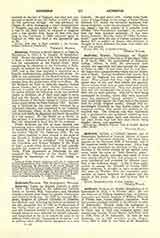

Anderton, ROBERT, VENERABLE, an English priest and martyr, b. in the Isle of Wight about 1560; d. April 25, 1586. He matriculated at Brasenose College, Oxford, in 1578. He afterwards went abroad, was converted, and then entered the college at Reims in 1580. It was there that he and Marsden began that companionship which was not broken even in death. Having completed their course, they set sail for England, but were overwhelmed in a storm. They prayed that they might die on land rather than on sea, and their prayer was granted. Driven ashore, they were at once seized and shortly after tried and condemned. They now pleaded that they had not transgressed the statute, as they had been cast on shore perforce. This led to their being summoned to London, where they were examined upon the celebrated “bloody question”, whether they would fight against the Pope, even if the quarrel were for purely religious causes. Though they acknowledged Elizabeth as their lawful queen in all temporal matters, they would not consent to the required test. The sentence was then confirmed, and a proclamation was published explaining their guilt. They were taken back and executed near the place where they had been cast ashore, being hanged, drawn, and quartered.
PATRICK RYAN

